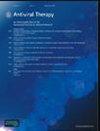抗逆转录病毒治疗依从性模式、病毒学抑制和耐药性的出现:来自乌干达和南非的巢式病例对照研究
IF 2.3
4区 医学
Q4 INFECTIOUS DISEASES
引用次数: 0
摘要
背景:不同抗逆转录病毒治疗(ART)依从性模式与耐药风险之间的关系尚不清楚。方法:我们在一项纵向队列研究中对开始以依非韦伦为基础的抗逆转录病毒治疗的个体进行了巢式病例对照分析。在治疗开始后6个月和12个月测量的主要结果是:1)病毒学抑制,2)病毒学失败伴耐药性,3)病毒学失败无耐药性。我们感兴趣的主要暴露是抗逆转录病毒治疗的依从性,在每次就诊前6个月内用电子药丸监测器测量,并按三种方式分类:1)6个月的平均依从性;2)跑步坚持度,定义为平均坚持9天的天数小于或等于10%、20%和30%;3)前6个月的3天、7天、28天治疗间隔天数。结果:我们分析了166例患者的数据,其中107例在观察期间出现病毒学失败,59例在6个月和12个月时出现病毒学抑制。病毒学抑制组(中位数为83%,IQR为58-96%)的平均依从性高于病毒学失败伴耐药组(中位数为35%,IQR为20-77%,两两P < 0.01)和病毒学失败无耐药组(中位数为21%,IQR为2-54%,两两P < 0.01)。虽然治疗间隔通常预测病毒学失败(P < 0.01),但它们不能区分有无耐药的失败(P > 0.6)。结论:在开始以依非韦伦为基础的抗逆转录病毒治疗的个体中,平均依从性模式,但不是治疗间隔的评估频率,区分有耐药性与无耐药性的失败。未来的工作应该探索基于整合酶抑制剂的方案的粘附-耐药关系。本文章由计算机程序翻译,如有差异,请以英文原文为准。
Antiretroviral therapy adherence patterns, virological suppression, and emergence of drug resistance: A nested case-control study from Uganda and South Africa.
Background Relationships between distinct antiretroviral therapy (ART) adherence patterns and risk of drug resistance are not well understood. Methods We conducted a nested case–control analysis within a longitudinal cohort study of individuals initiating efavirenz-based ART. Primary outcomes of interest, measured at 6 and 12 months after treatment initiation, were: 1) virologic suppression, 2) virologic failure with resistance, and 3) virologic failure without resistance. Our primary exposure of interest was ART adherence, measured over the 6 months before each visit with electronic pill monitors, and categorized in three ways: 1) 6 months average adherence; 2) running adherence, defined as the proportion of days with average adherence over 9 days of less than or equal to 10%, 20%, and 30%; and 3) number of 3-, 7-, and 28-day treatment gaps in the prior 6 months Results We analyzed data from 166 individuals (107 had virologic failure during observation and 59 had virologic suppression at 6 and 12 months). Average adherence was higher among those with virologic suppression (median 83%, IQR 58–96%) versus those with virologic failure with resistance (median 35%, IQR 20–77%, pairwise P < 0.01) and those with virologic failure without resistance (median 21%, IQR 2–54%, pairwise P < 0.01). Although treatment gaps generally predicted virologic failure (P < 0.01), they did not differentiate failure with and without drug resistance (P > 0.6). Conclusions Average adherence patterns, but not the assessed frequency of treatment gaps, differentiated failure with versus without drug resistance among individuals initiating efavirenz-based ART. Future work should explore adherence-resistance relationships for integrase inhibitor-based regimens.
求助全文
通过发布文献求助,成功后即可免费获取论文全文。
去求助
来源期刊

Antiviral Therapy
医学-病毒学
CiteScore
2.60
自引率
8.30%
发文量
35
审稿时长
4-8 weeks
期刊介绍:
Antiviral Therapy (an official publication of the International Society of Antiviral Research) is an international, peer-reviewed journal devoted to publishing articles on the clinical development and use of antiviral agents and vaccines, and the treatment of all viral diseases. Antiviral Therapy is one of the leading journals in virology and infectious diseases.
The journal is comprehensive, and publishes articles concerning all clinical aspects of antiviral therapy. It features editorials, original research papers, specially commissioned review articles, letters and book reviews. The journal is aimed at physicians and specialists interested in clinical and basic research.
 求助内容:
求助内容: 应助结果提醒方式:
应助结果提醒方式:


